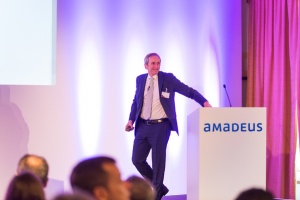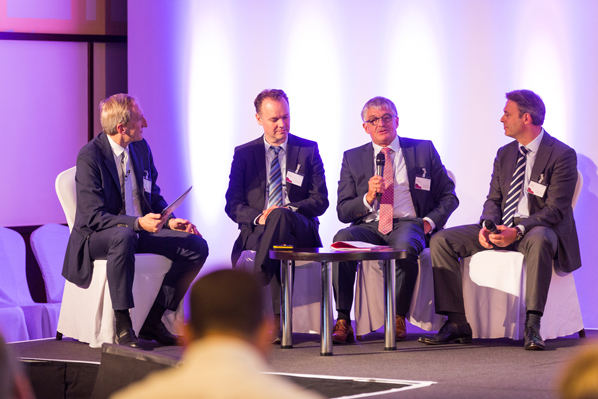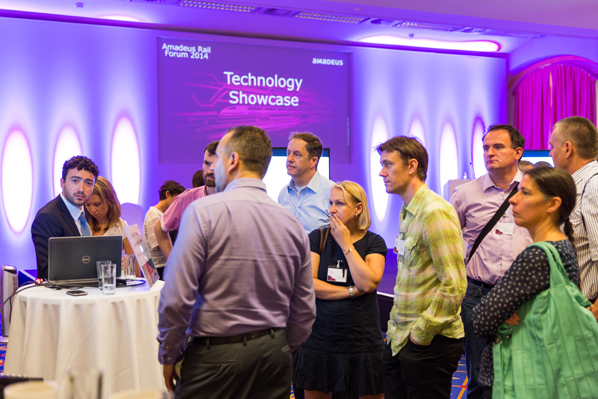Amadeus Rail Forum 2014: Ever closer union?
 Thomas Drexler, director, Rail & Ground Travel, Amadeus, welcomes guests to the Amadeus Rail Forum 2014
Thomas Drexler, director, Rail & Ground Travel, Amadeus, welcomes guests to the Amadeus Rail Forum 2014 European railways are often portrayed as a deeply conservative industry, so far unaffected by the disruptive competition and subsequent consolidation seen in the aviation sector.
With national providers apparently safe in domestic markets there seems to be little catalyst for change.
But with technology developing rapidly and start-ups taking advantage of European Union liberalisation to launch new routes the old model may well be about to break down.
Breaking Travel News editor Chris O’Toole reports from the Amadeus Rail Forum 2014.
While low-cost airlines have soared skyward in recent years, with ever more passengers taking advantage of flexible, responsive route networks, travel by rail has somewhat been left in the sidings.
Incumbent national rail operators - including Deutsche Bahn of German, France’s SNCF and Renfe in Spain - have focused on domestic fifes, building traffic at home while rarely developing potentially lucrative international routes.
This lack of competition has ossified an already entrenched system, with a cumulative detrimental effect on European rail travel as a whole.
Prohibitive barriers to entry, with the delivery of new rolling stock often taking years and an investment of many million euros, have also stifled competition, while inefficient ticket distribution leaves many passengers unaware of what is on offer.
The lucrative freight contracts enjoyed by many rail operators also occasionally see passenger operations relegated to an afterthought on international routes.
Even many of the industry leaders arriving for the Amadeus Rail Forum, this year held in sunny Vienna, admitted they did so by air.
Vienna
But there are signs the European rail sector may changing, not least in the Austrian capital.
A star of the Forum was Westbahn, one of the few new entrants to take advantage of a European Union-backed drive to liberalise the market.
An open access railway company operating on Austria’s Western Railway since December 2011, the company has borrowed techniques developed by low-cost airlines to challenge incumbent ÖBB.
Its seven train sets are identical, lowering maintenance costs, while it takes a matter of minutes to turn trains around at Vienna and Salzburg, meaning they can spend more time moving passengers along the line.
However, challenges remain, with Christian Pettauer, chief information officer with Westbahn, highlighting the problems caused by the monopolistic position of incumbents when seeking to launch new services.
He told Breaking Travel News: “There are only a certain number of tracks; those slots are controlled by companies which are often competitors on routes.”
He added: “Borders are a comfort zone for the incumbents.”

Industry leaders from across Europe were on hand to discuss the latest rail trends
Challenges to the status quo are coming from other areas.
For over 80 years scheduled long distance coach services were practically forbidden in Germany, but a recent market liberalisation there has seen Deutsche Bahn’s dominance in intercity markets come under attack.
New coach carriers, while positioning themselves as low-cost, have sought to challenge selling points employed by railways in their battle against air travel, with vehicles offering free wi-fi, free snacks, and the chance to break long-trips into more convenient sections.
Mathias Hueske, chief information officer with Deutsche Bahn, told Breaking Travel News: “We have relied on our speed, the fastest among our competitors, and that we are the most ecologically friendly way to travel. You can move around on the train, it is more stable, more relaxed. But we must make our passengers aware of what we offer.
“It is frustrating for us how fast these competitors can expand. It takes a long time to open a new route on rail, with schedules and new trains, but buses take matter of weeks; buy a bus, put your name on it, and off you go.”
More challenges of this kind may shake rail out of its lethargy.

The possibilities afforded by fast changing rail technology were a key theme
Conference host Amadeus Rail is offering one path to rail operators to improve, with the development of a community platform for rail.
With industry liberalisation a slowly developing reality, growing consumer appetite for rail travel, and the potential of the European high-speed network to transform long-distance rail travel, the tech giant is hoping the sector will become increasingly cross border - not only in terms of operations, but also in customer base.
One early step has been the launch of the partnership with BeNe - a joint venture between NS of the Netherlands and SNCB – which will see the operators adopt a community IT platform designed to become more flexible and strengthen multichannel and multicarrier distribution.
As Arnold De Brauwer, president of BeNe RI, explained: “We will benefit from next-generation technology, without having to build this ourselves. It will transform the way we do business, because we will be able to focus our energy on delivering the best possible service to our customers, knowing that our systems are in the safe hands of Amadeus.”
With the two railway companies positioned geographically in the heart of Europe, they are particularly well-placed to make the most of this opportunity, and understand its challenges.
Alongside improved distribution, simply letting passengers know what is available and to buy tickets for international travel in one place, the further integration of standards and regulations would be another method of moving forward.
The pace of European Union change in this area, though, remains glacial.
There is also space in the market for a third party to come in and become a retailer for the rail network, if railways are unable or unwilling to do this for themselves.
There is a long journey ahead, but European railways may well be on the right track.
Photography: Tony Gigov

